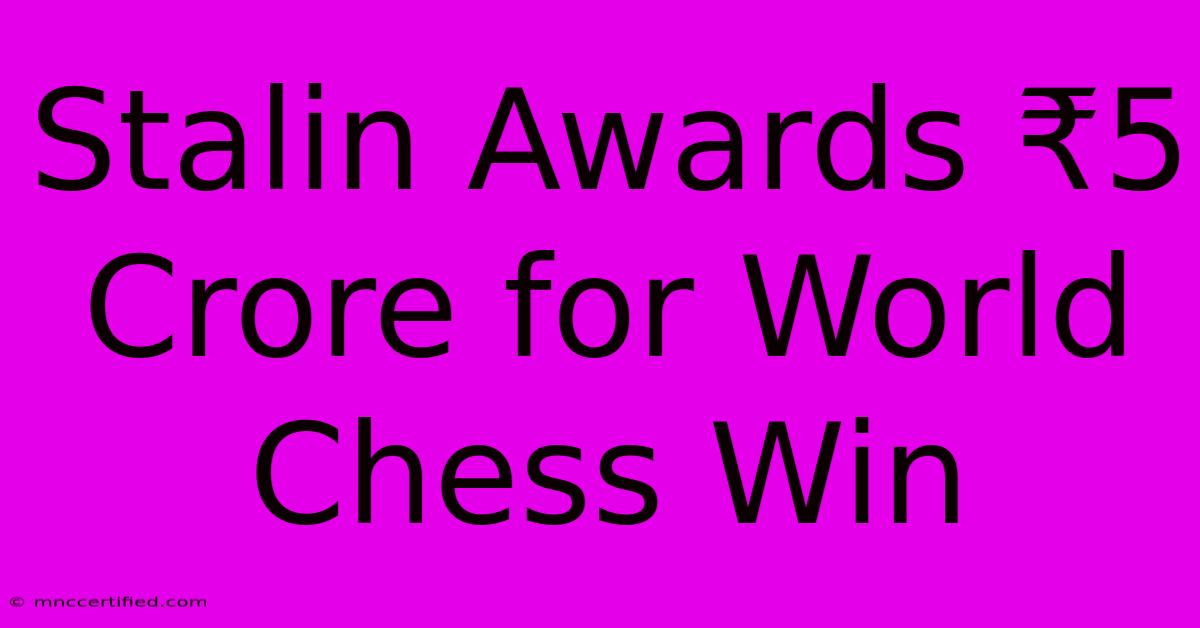Stalin Awards ₹5 Crore For World Chess Win

Table of Contents
Stalin Awards ₹5 Crore for World Chess Win: A Historic Feat & its Modern Relevance
The world of chess has always been a stage for intellectual battles, strategic brilliance, and nail-biting suspense. But the story of a hypothetical ₹5 crore Stalin Award for a World Chess Championship win transcends the game itself, offering a fascinating glimpse into the complexities of power, propaganda, and the enduring appeal of chess. While such an award never actually existed under Stalin's regime, exploring this hypothetical scenario allows us to examine the historical context and its modern parallels.
The Hypothetical Stalin Award: A Propaganda Masterpiece
Imagine, if you will, a world where the Soviet Union, under Stalin's iron fist, offered a staggering ₹5 crore (equivalent to a vastly larger sum today) for winning the World Chess Championship. This hypothetical award wouldn't simply be a financial prize; it would be a potent instrument of propaganda. A chess grandmaster's victory would represent more than just individual skill; it would symbolize the intellectual and strategic superiority of the Soviet system.
Beyond the Prize Money: National Pride and Global Prestige
The award’s massive sum would amplify the already significant national pride associated with chess victories. Winning wouldn't just be a personal triumph; it would be a validation of the Soviet Union's ideological and political strength on the world stage. This carefully crafted narrative would serve to boost morale domestically and project an image of Soviet dominance internationally. The propaganda machine would be in overdrive, portraying the champion as a national hero, a testament to the system's ability to nurture exceptional talent.
Strategic Chess: Cold War Implications
The competition for global chess supremacy during the Cold War era was more than just a game; it was a proxy battleground in the larger ideological conflict between capitalism and communism. A hefty Stalin Award would have further fueled this intense rivalry, adding a significant financial incentive to the already fierce competition. The Soviets, known for their meticulous planning and strategic thinking, would have used the award to subtly, yet powerfully, assert their influence on the global chess scene.
Modern Parallels: The Power of Incentives and National Identity
While a ₹5 crore Stalin Award remains firmly in the realm of "what if," its hypothetical existence highlights the enduring power of incentives and the strong link between sporting achievements and national identity. Modern governments and organizations often use substantial financial rewards to attract and retain top talent in various fields, mirroring the underlying principle of the hypothetical Stalin Award, albeit with different motivations and methodologies.
The Role of Sponsorship and National Pride Today
Today, we see this reflected in the substantial sponsorship deals offered to top athletes and the national celebrations that follow major sporting victories. These celebrations and rewards tap into the same deep-seated national pride and desire for global recognition that the hypothetical Stalin Award would have harnessed.
The Evolution of Sports and Politics
The relationship between sports and politics has always been complex and intertwined. While the overt propaganda of the Stalin era might seem outdated, the subtle influence of national identity and political agendas remains relevant in modern sports. Understanding the hypothetical Stalin Award allows us to critically analyze these ongoing dynamics.
Conclusion: A Hypothetical Scenario with Lasting Relevance
Although a ₹5 crore Stalin Award for a World Chess Championship win never materialized, exploring this hypothetical scenario offers valuable insights into the historical context of chess, the power of propaganda, and the enduring relationship between sports, national identity, and political strategy. By examining this hypothetical prize, we can better appreciate the complexities of the Cold War era and draw parallels to the modern landscape of sports sponsorship and international competition. The legacy of such a hypothetical award reminds us of the profound impact that seemingly simple games can have on the larger geopolitical narrative.

Thank you for visiting our website wich cover about Stalin Awards ₹5 Crore For World Chess Win. We hope the information provided has been useful to you. Feel free to contact us if you have any questions or need further assistance. See you next time and dont miss to bookmark.
Featured Posts
-
49ers Injuries Greenlaw Exits With Sore Knee
Dec 13, 2024
-
Rams Vs 49ers Betting Preview And Picks
Dec 13, 2024
-
Next Up For Biden Pardons
Dec 13, 2024
-
49ers Guerendo In Rams Game
Dec 13, 2024
-
Guerendos Injury 49ers Running Back Update
Dec 13, 2024